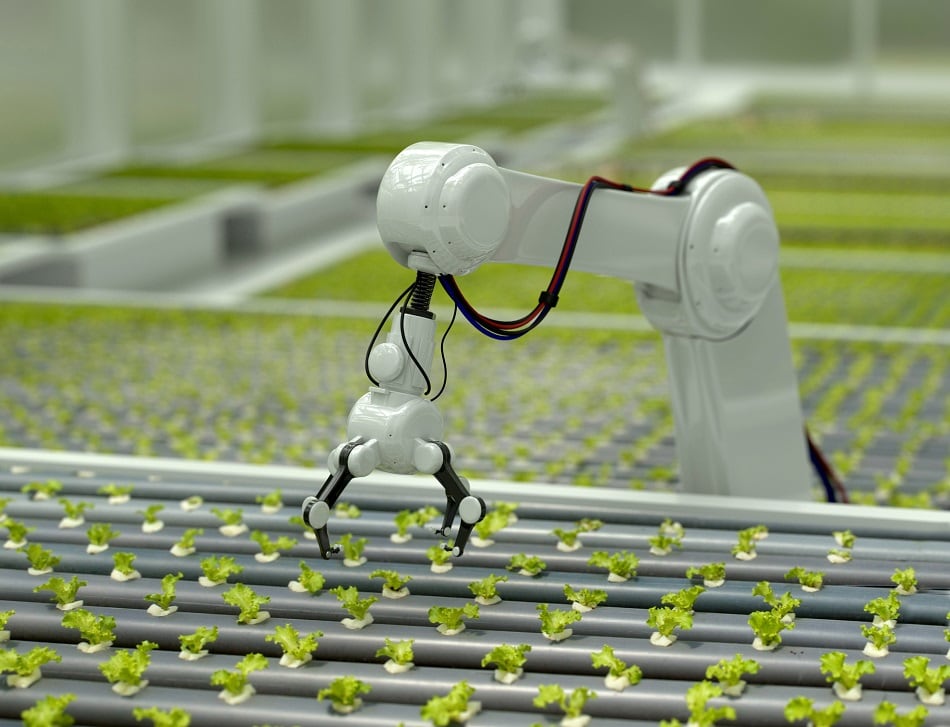"The food transition is still in its infancy but is being propelled by seismic tailwinds: massive demographic change spurring new consumer demand, significant advancements in the biology, chemistry and physics of food production to create new choices and now capital markets anchored by ESG that want to fund high growth, disruptive companies," noted Sanjeev Krishnan S2G Ventures managing director and chief investment officer.
According to S2G Ventures' report, agrifoodtech startups globally raised $24bn in the first half of 2021 (not far off from the entirety of 2020, which broke records with around $30bn in funding for the category).
A new era of robotics and AI
In terms of what will continue to capture the most investment interest, S2G notes how robotics and AI innovation is helping to increase efficiencies while reducing labor needs across the entire food system. Advancements in robotics will also support the dwindling workforce in the farming industry, which is expected to drop by 6% in number by 2029.
"In the field and in [controlled environment agriculture] operations, robots can collect data and interact with other computer systems to make critical decisions. Companies are tackling everything from direct harvesting to precision management of nutrients, pests, weeds and diseases," stated S2G Ventures, noting how automation technologies can be implemented on the farm level all the way downstream to the production floor to curb food waste and speed up services such as order fulfillment for food manufacturers.
"Automation brings the potential to improve operational efficiencies, increase output and grow revenues throughout the food supply chain," it adds.
In the CEA sector in particular, S2G said that robots and AI can collect vital data on plant growth and plant genetics. But what does the rise in the use of robots mean for the human workforce?
"Many of these robots will work collaboratively alongside their human counterparts. Automated processes will also enable farms and food companies to prove provenance with a recorded chain of custody thereby improving traceability. The incorporation of robots into the workflow will also allow companies to redeploy people to more value-added work, resulting in higher paid, more technical jobs in these industries," claimed S2G.
Fermentation and cellular agriculture
The supply chain disruptions experienced over the past two years have created a sense of urgency to make supply chains more nimble, sustainable, localized and less wasteful, said S2G, noting how the development of fermentation processes in the alternative protein sector holds a lot of promise.
"Conventional animal agriculture requires large amounts of land, energy and water and contributes to emissions, soil and water degradation, and deforestation. Additionally, consolidation within the meat industry has increasingly concentrated power and profits in the hands of a few companies, at the expense of farmers, communities and consumers. This consolidation also makes meat production very vulnerable to supply chains disruptions as we witnessed over the course of the pandemic," said S2G in its report.
These factors have sparked interest and investment into alternative proteins made using fermentation technologies and beyond traditional plant-based formulations, noted S2G.
"The vast biological diversity of microbial species combined with virtually limitless capabilities in biological synthesis translates to essentially infinite opportunities for novel alternative protein products to emerge from fermentation-based approaches," said S2G. As such, "we are going to see fermentation companies become sought after targets for big food and ingredient companies, manifested through partnerships and M&A."
According to S2G, over $1bn in investment capital has been raised by alternative protein-dedicated fermentation companies since 2020.
“We are witnessing the reinvention of fermentation - to a future that will push the boundaries of biology by creating new foods and medicines that will be more precise, healthy and more sustainable," added Krishnan.
Another booming area of opportunity is in cellular agriculture (the production of agricultural products such as chicken, beef, and dairy using cell cultures), which consulting firm Kearney estimates could constitute 35% of global meat consumption by 2040.
“Economically viable cellular agriculture technology will be ready to come to market in 2022. Cellular agriculture could be a black swan event in our food systems given how much of our resources are devoted to animal and seafood products and the role they play in our diets,” noted S2G managing director Matthew Walker.
Food as medicine
A core pillar driving the global food transition is in the fundamental shift in consumers' mindset that food can improve their wellbeing and play a role in preventing chronic disease, according to S2G.
“The convergence of food and healthcare is still nascent, and a widely undefined sector. Our view is that it goes beyond better-for-you products and really explores the clinical and pharmacological impact of food and food derivatives. We see early opportunities in this sector and see a highly complementary addition to the existing healthcare system,” said Dan Ripma, vice president at S2G.

